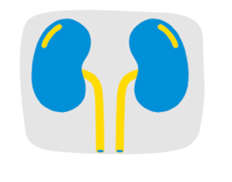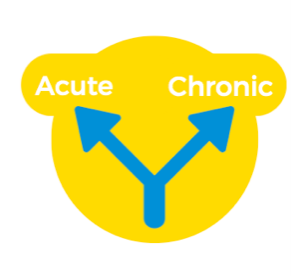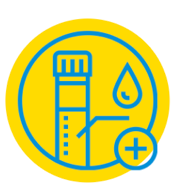
In Partnership with CSL Behring
What is Kidney Rejection?

A transplanted kidney is foreign to your body, so your immune system may react strongly. This reaction is what leads to kidney rejection. Your medications are meant to suppress your immune system to prevent it from attacking the new kidney, but sometimes kidney rejection occurs regardless. Most commonly, kidney rejection happens in the first six months after surgery, but it can happen at any time after transplant. When caught early enough, kidney rejection can usually be treated before there is any irreversible damage. Consult your medical team with any changes to your health as well as any signs and symptoms of kidney rejection that they tell you to look out for, which may include:
- Pain or tenderness around the kidney transplantation site
- Swelling
- Sudden weight gain (greater than 2-4 pounds) within 24 hours
- High fever (greater than 100 degrees Fahrenheit or 38 degrees Celsius)
- “Flu-like symptoms” (chills, nausea, vomiting, diarrhea, aches or muscle weakness, headache)
- Fatigue
- Decrease in urination
Having a “rejection episode” does not necessarily mean your transplanted kidney will be completely rejected or that it is no longer functioning. Early recognition and treatment can help maintain your transplanted kidney and prevent future rejection episodes. However, if left unrecognized or untreated for too long, kidney rejection can cause major damage to the transplanted organ. Other causes of kidney rejection may include infection, long-term side effects of medications, and not taking prescribed anti-rejection medications.
Types of Kidney Rejection

Kidney rejection is classified by the timing of rejection or the part of the immune system that is involved.
For timing, kidney rejection is split into 2 classes: acute and chronic.
- Acute rejection can happen anywhere from days to weeks after surgery, and it is most common within 6 months of the transplant.
- Chronic rejection may happen months or years after transplantation, and it is not well understood.
Fortunately, the five-year survival rate of transplanted kidneys is currently higher than 80%. Taking your medications as prescribed and checking in regularly with your medical team may help increase the lifespan of the transplanted kidney and catch kidney rejection early. [1]
Monitoring for Kidney Rejection
The goal of certain clinic visits and lab tests is to test the function of the transplanted kidney and identify problems as early as possible. Consult your medical team for medical advice and information about any scheduled blood work or tests, as understand your specific transplant and health needs.

Protocol kidney biopsies may be scheduled around 3-6 months post-transplant as well as 1-year post-transplant, but the schedule varies from person to person as well as by the transplant program. During a kidney biopsy, a small sample of the transplanted kidney tissue is removed with a small needle and examined for signs of rejection. Biopsies are considered the gold standard for evaluating any damage to the transplanted organ. However, biopsies can only detect rejection symptoms that are present at the moment, so it is important to consult your transplant team if you experience any symptoms of kidney rejection or changes to your health between scheduled visits.
Aside from biopsies, routine blood work and renal ultrasounds may also help screen for rejection. Clinical indicators used to assess possible rejection may include:
- an increase in serum creatinine, which is a marker of kidney function detected in blood tests
- a significant decrease in urine output
- checking for a complete blood count
- taking a metabolic profile to assess kidney function
- checking the levels of the anti-rejection medications (i.e. tacrolimus, cyclosporine),
- an analysis of the urine
- administering a viral Polymerase Chain Reaction (PCR) test for possible infection.
It is possible to not experience any symptoms in the early stages of kidney rejection, so it is crucial for transplant recipients to follow their doctor’s medical advice and adhere to scheduled check-ins. It is also possible that the symptoms of rejection can be due to other conditions, such as infection, which may compromise a transplanted kidney. It is important to report any changes in your health to your medical providers.
Treating Kidney Rejection

The first step in treating kidney rejection is accurately diagnosing and classifying the type of rejection, as well as the parts of the immune system involved. Treatment is guided by the kidney biopsy, and the aggressiveness of treatment is determined by the severity of the rejection. Conventional treatment may include increasing the dose of anti-rejection medications such as steroids. Other medications may be prescribed, specifically for combatting the immune cells that have been inappropriately activated to target a transplanted kidney.
If it’s not Kidney Rejection, What Is It?
The only way to rule out kidney rejection is by kidney biopsy. However, there may be alternative explanations for symptoms. Because anti-rejection medication suppresses an individual’s immune system, which is meant to protect the body from external invasion, symptoms could also be caused by an infection.[2] It is important to be seen my your doctor if you experience any changes to your health so they can provide you with an accurate diagnosis and treatment plan.
Future of Drugs for Rejection

The field of anti-rejection medications has changed dramatically in recent years, and new research is investigating promising avenues for improving detection, prevention and treatment of kidney rejection.
As previously stated, kidney rejection can occur without any symptoms, and early detection and treatment is crucial for prolonging the lifespan of the transplanted kidney. Researchers are developing cell-free DNA technology to identify signs of kidney rejection that are currently undetected by conventional tests[3]. Development of biomarkers with increased sensitivity and better screening protocols may help transplant teams catch rejection earlier.
Another avenue of research is improving the prevention of kidney rejection by better understanding the risk factors for rejection. Using clinical data from transplant recipients, researchers are developing better models for predicting rejection, which could one day be used to tailor medications and monitor for personalized risk profiles. Researchers are also investigating immunotherapy strategies that may block earlier events which would otherwise lead to transplant rejection. Research is also exploring whether gene therapy can potentially restrict immunosuppression to the transplanted organ before transplantation occurs. This research is in its early stages, but if it is safe and effective, could potentially prevent the immune system from activating without suppressing the entire body’s immune system.

Treatment of rejection is a continuously evolving field and research is moving toward more selective and targeted drugs meant to block the parts of the immune system that attack the kidneys, while leaving the rest of the immune system active. Some research aims to potentially increase the efficacy and reduce side effects of anti-rejection medications by avoiding suppression of the entire immune system. As our understanding of transplant rejection and the immune system improves, new pathways and molecules are unearthed as promising candidates for potential new drug therapies and treatments for kidney rejection[4].
1]https://www.ncbi.nlm.nih.gov/books/NBK535435/#:~:text=hours%20after%20grafting.-,Acute%20rejection%20occurs%20days%20or%20weeks%20after%20transplantation%20and%20can,after%20organ%20or%20tissue%20transplantation.
[2] https://pubmed.ncbi.nlm.nih.gov/12464131/
[3] https://www.natera.com/organ-health/prospera-organ-transplantation-assessment/clinicians/#:~:text=Prospera%20is%20a%20transplant%20rejection%20test%20that%20uses%20a%20simple,rejection%20of%20a%20transplanted%20kidney.&text=Read%20Flipbook-,Through%20the%20use%20of%20advanced%20cell%2Dfree%20DNA%20technology%2C%20Prospera,might%20lead%20to%20kidney%20loss.
[4] https://link.springer.com/content/pdf/10.2165/00003495-199754040-00003.pdf


